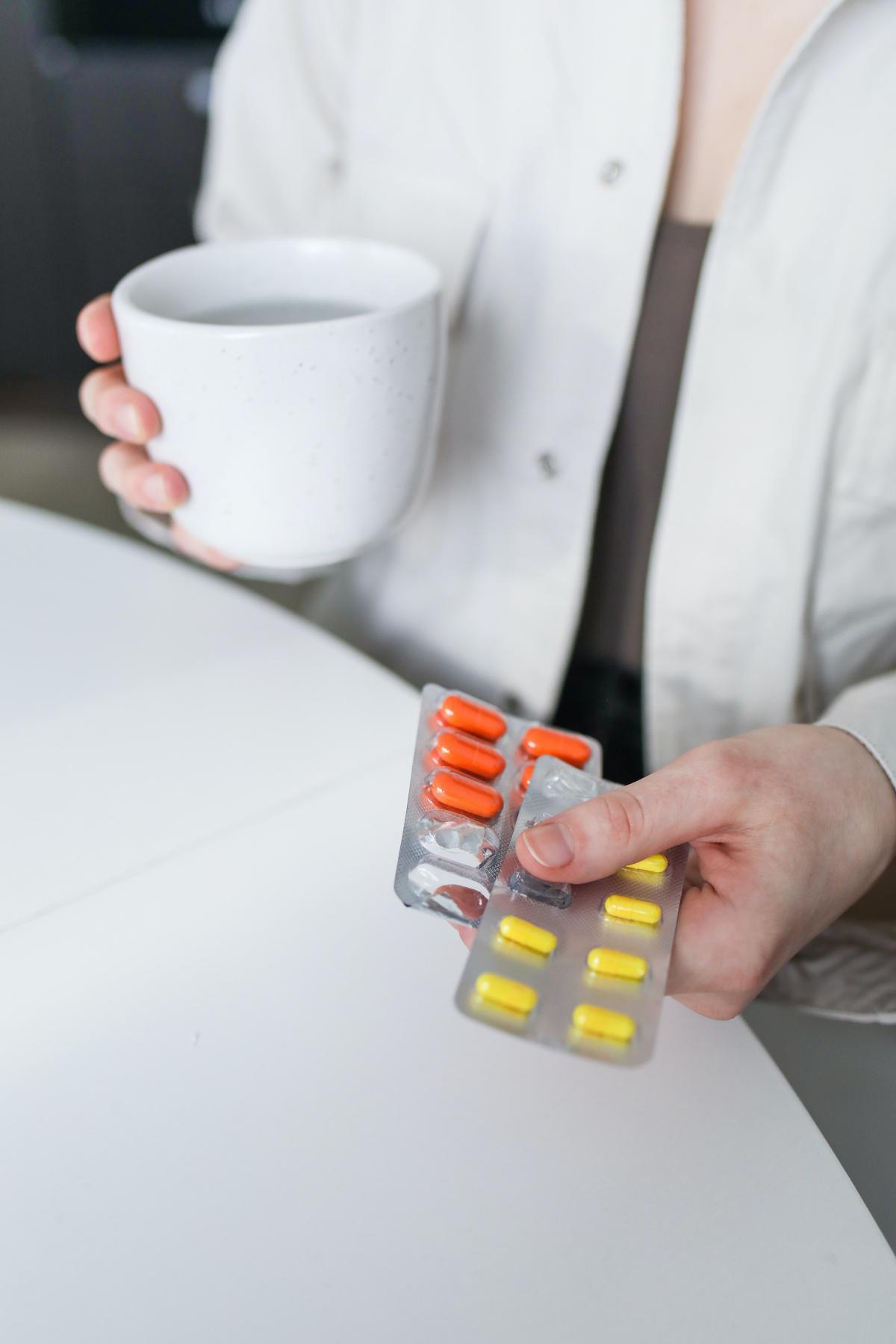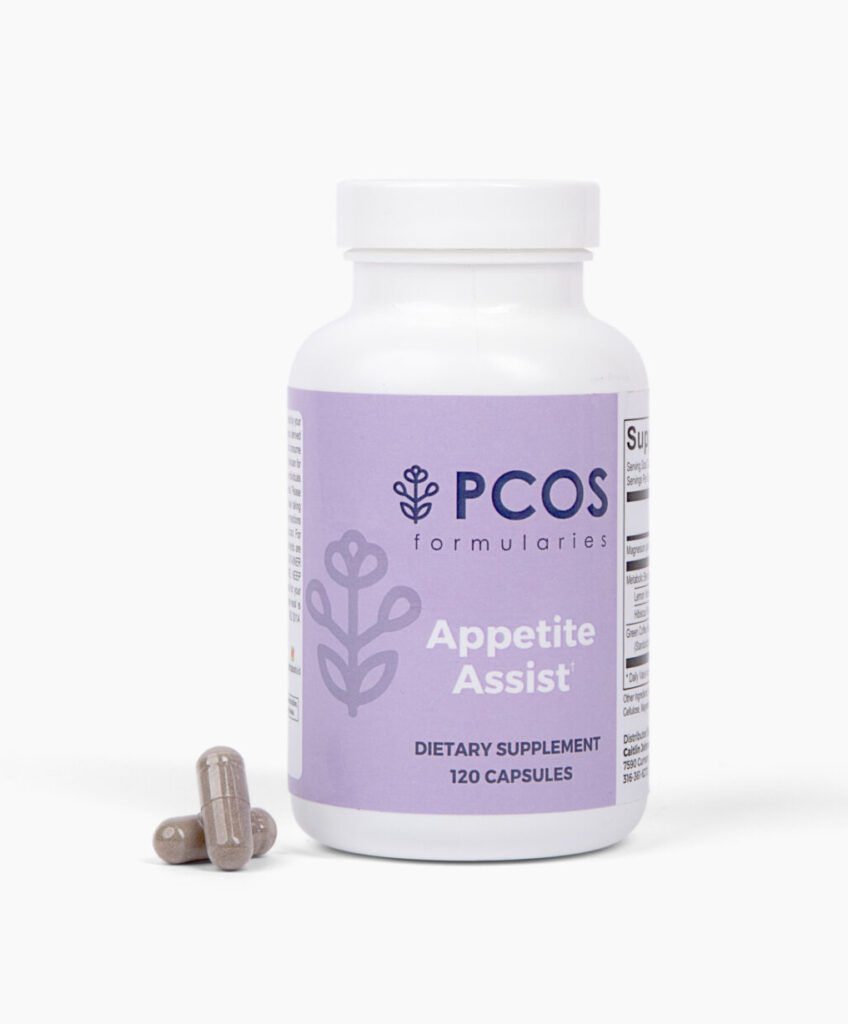at a glance
Supplements, Medications and Procedures for PCOS Management: Alleviating Symptoms and Improving Health
Table of Contents
- 01 - PCOS Overview - Why would you need prescription medication?
- 02 - Can Polycystic Ovary Syndrome be cured with medicine?
- 03 - What does it mean for a medication to be used “off label”?
- 04 - Informed Consent with Any Medication
- 05 - What Types of Medications are Prescribed for Women with Polycystic Ovary Syndrome?
- 06 - Improving Blood Sugar and Lowering Insulin Levels: Insulin Sensitizing Medications
- 07 - Metformin for PCOS Treatment
- 08 - Semaglutides for Reducing Insulin Resistance (Wegovy, Ozempic and Compounded Semaglutide)
- 09 -What medication helps PCOS women lose weight?
- 10 - Metformin for Weight Loss
- 11- Wegovy for PCOS Weight Loss Treatment
- 12- Hormone Suppressing Medications for Polycystic Ovary Syndrome
- 13- Hormonal Contraceptives (Birth Control)
- 14- Spironolactone to Lower Androgens
- 15- Progesterone Therapies to Stimulate Bleeds, Avoid Miscarriage or Improve Symptoms
- 16- Ovulation Stimulating Medications/ Assisted Reproductive Medications for PCOS
- 17- Clomid(Clomiphene) to Induce Ovulation in PCOS
- 18- Letrozole(Femara) to Induce Ovulation in PCOS
- 19- Mental Health and Mood Disorder Support
- 20- Removing Stigma and Choosing Appropriate Therapies
- 21- What Else Can You Do?
- 22- References
- 23 - DISCLAIMER
Polycystic ovary syndrome (PCOS) is a hormonal disorder that affects many women of reproductive age. It is characterized by hormonal imbalances, which can cause many symptoms such as irregular menstrual cycles, weight gain, acne, and excess hair growth.
While there is no cure for PCOS, supplements and medications can help alleviate symptoms and improve overall health.
Here are some ways in which supplements and medications can help treat PCOS:
1. Supplements for the management of PCOS
Supplements can help manage PCOS symptoms by addressing specific nutrient deficiencies that are common in women with PCOS.
Women with PCOS often have low levels of vitamin D, magnesium, and omega-3 fatty acids. Taking supplements to address these deficiencies can help improve overall health and alleviate symptoms.
Inositol supplements have also been shown to be effective in managing PCOS symptoms. Inositol is a natural chemical your body makes that is involved in insulin signaling and can improve insulin sensitivity.
However, women with PCOS don’t make enough of this chemical and over-convert it to less helpful forms. Taking myoinositol supplements can help manage weight, regulate menstrual cycles, and reduce acne and excess hair growth.

2. Birth control pills and cyclical progesterone for PCOS management
Birth control pills can help by limiting follicles from maturing and thus limiting androgen production. They can be helpful to reduce symptoms and prevent risks of uterine hyperplasia.
There are many options and you should consider discussing the best options with your medical provider.

3. Anti-Androgen Medications for PCOS Management
Anti-androgen medications can help reduce excess hair growth and acne by blocking the effects of androgens, the “male hormones” that are often elevated in women with PCOS. Spironolactone is a commonly used anti-androgen medication for PCOS.
4. Medications that Improve Insulin Sensitivity for PCOS
Medications that improve insulin sensitivity, such as metformin, can help manage weight and improve overall health in women with PCOS. These medications can also help regulate menstrual cycles and reduce the risk of developing type 2 diabetes.
Lately there has been an increase in the use of other stronger medications like Ozempic or Wegovy.

What Types of Medications are Prescribed for Women with Polycystic Ovary Syndrome (PCOS)
There are many different categories of medications that are frequently prescribed to a patient with PCOS. Depending on your goals and symptoms a doctor may offer or recommend some of the following:
- Insulin Sensitizing Medications
- Weight Loss Medications
- Hormone Suppressing Medications
- Mood and Mental Health Medications
- Ovulation Stimulating Medications/ Assisted Reproductive Medications for PCOS
Improving Blood Sugar and Lowering Insulin Levels: Insulin Sensitizing Medications
There are multiple options in this category and usually these often have downstream affects of impacting other symptoms or labs. As insulin levels decrease we typically also see androgen levels decrease and weight loss result.
If you would prefer options that can lower insulin levels, control appetite and help you lose weight without a prescription, make sure you check out our foundations bundle for PCOS treatment at PCOS Formularies.
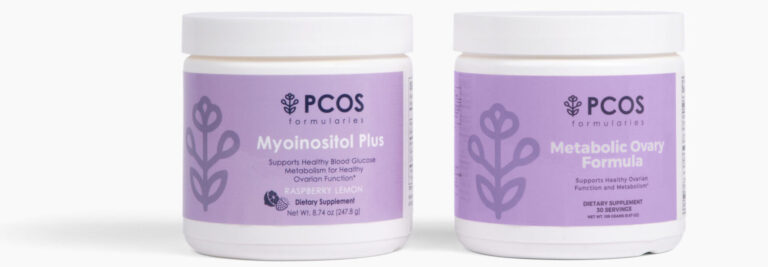
Metformin for PCOS Treatment
One of the most common medications for managing your blood sugar is metformin. Metformin is traditionally used as a diabetes management drug used to increase your sensitivity to insulin by increasing your body’s ability to get blood sugar from the blood to the inside the cell. (2)
This drug is also commonly called Glucophage. Other brand names it goes by around the world are: Axpinet, Diagemet, Glucient, Glucophage, and Metabet.
Lowering your insulin is especially important in PCOS, as properly managed insulin helps balance other hormones in the body which can help with fertility. If high insulin levels persist other conditions like heart disease, diabetes and metabolic syndrome become unavoidable. (3) Metformin may be a beneficial drug to manage both your insulin and blood sugar levels.
Sometimes this is something that is hard for people to take because of gastrointestinal tract issues like diarrhea or even nausea. Slowly increasing your dosage can help with this. Many people need to take an extended-release version of this drug to help decrease the symptoms.
Almost every person with PCOS is offered metformin at some point in their life and often I see the doses recommended don’t align with the research or what we see in clinical practice. Taking less than 1500 mg doses of metformin will make it difficult to benefit from this medication.
If your doctor hasn’t discussed alternatives to metformin let me offer some alternatives. A supplement called inositol has been shown in studies to work as well as metformin in helping reduce glucose and insulin levels and helping to stimulate ovulation. Check out our blog article on myoinositol.
Other supplements that can improve insulin resistance are: berberine, magnesium, N-acetyl-cysteine (NAC) and even taking a supplement or cooking with cinnamon. Dietary strategies, movement and even improving sleep quality are all very important ways to improve this as well.
Another consideration if you are on metformin, plan to go on this drug, or have recently come off of it, is that this medication increases your need for vitamin B12. Vitamin B12 is found exclusively in animal products so if you are vegan or vegetarian, this is essential for. you to be testing and supplementing with.

Semaglutides for Reducing Insulin Resistance (Wegovy, Ozempic and Compounded Semaglutide)
This class of drug is recently gaining a lot of attention in the media. As such patients are asking for it more often and we have seen an increase in doctors prescribing it.
The mechanism of action to help improve insulin resistance is a bit different than metformin. If you are interested in learning more about it, check out our article on Ozempic.
Ozempic is a medication that is different than most you have likely tried. It is a once weekly at-home injection whereas metformin is a pill usually taken multiple times daily.
With all semaglutide the manufacturer recommends that you discontinue use for two months prior to actively trying to conceive.
There are some great benefits of this medications, serious side effects, and important questions you need to ask your doctor if you are going to trial them.
Consider the following questions:
- Will my insurance cover this prescription with my current diagnosis’?
- How long do you anticipate it taking for me to reach a goal weight/lab parameter while on this medication?
- Based on my current symptom picture what aspect of my health and PCOS are you expecting this to improve?
- If you are trying to conceive (actively) your doctor needs to know this as it is contraindicated to conceive while on this medication.
- If my weight loss stalls, what will your recommendation regarding this medication be?
What Medication Helps PCOS Women Lose Weight?
Metformin for Weight Loss
Metformin is also effective for reducing fat tissue and helping patients lose weight. It is important to realize that this medicine alone will not help accomplish this. All the studies looking at metformin highly recommend that taking this medication is to be done in unison with dietary and lifestyle changes.
Wegovy and PCOS Weight Loss Treatment
Wegovy has the same mechanism of use as Ozempic but is typically being prescribed in higher doses for weight loss. In my clinical experience, Wegovy is a prescription that is easier to get insurance to cover because it is approved by the FDA for weight loss.
Ozempic on the other hand is approved for the treatment of Diabetes. Unless you have a diabetes diagnosis you will likely want to discuss the use of Wegovy instead (which will also have benefits for blood sugar regulation and insulin resistance).
Wegovy is taken in the same way as Ozempic. It is a once-weekly injection. As with any medication, it’s important to consider the benefits, risks, alternatives, side effects, and the length of time the physician expects you to remain on this drug.
Wegovy and Ozempic both come with pretty frustrating side effects including nausea, vomiting, diarrhea, headaches, and the possibility of increasing depression and anxiety.
As with anything, there is a thorough discussion to be had to weigh the risks and benefits. One of the ways Wegovy helps accomplish weight loss is in its power to decrease appetite.
There are other appetite suppression medications I have seen prescribed for PCOS, that are used less commonly like phentermine(yep, same stuff we are throwing back to when your mom was trying to lose weight in the 90s). As these medications are being used less and less, we won’t take the time in this article to discuss them.
If you are looking for a non-prescription support for appetite regulation you can trial the PCOS Formularies supplement: Appetite Assist that was created for this express purpose!
Hormone Suppressing Medications for Polycystic Ovary Syndrome
Decreasing androgens and improving symptoms are some of the main reasons these medications are prescribed. There is also another reason that isn’t often discussed and that is related to preventing certain types of female cancers by ensuring regular menstrual bleeds.
You may have heard your doctor speak regarding some of the medications in this category as “regulating your hormones”. I have a hard time with this description because it’s deceiving.
These medications are really putting a hormone disruptor in your body and tricking it into thinking you are making the real thing, thus suppressing your own hormone production.
I don’t have a moral issue with taking these medications. I have a moral issue in how they are described and prescribed as if they are candy and have no long lasting health effects.
Hormonal Contraceptives (Birth Control)
Hormonal birth controls are another option for those looking to manage PCOS symptoms and wish to avoid pregnancy. There are multiple ways that a combined oral contraceptive pill can help PCOS.
This option doesn’t just come in pills there are also injectables, devices placed within your body like a hormonal IUD, Nuva Ring, or implant like Nexplanon. There are a lot of options and this is a big industry with billions of dollars behind it.
You will want to make sure you are on the right type because they are all different and some will not have the same benefits of lowering male hormones and thus your PCOS symptom picture.
Hormonal birth control essentially suppresses the production of sex hormones and increases a compound called, sex hormone binding globulin (SHBG).
SHBG is something that is kind of like Mrs. PacMan. It floats around the bloodstream gobbling up free testosterone and essentially turning it off before it acts on different tissues. That is one way birth control pills can reduce excessive hair growth, improve acne, and decrease hair loss. (4)

While birth control may help symptoms in the short term, dietary and lifestyle interventions may be a greater tool to help your body naturally regulate your hormones rather than synthetically suppressing them.
You can naturally balance your hormones by including blood sugar friendly foods in your diet and creating a PCOS friendly plate. Some other ways to naturally balance hormones are:
- Eating enough protein
- Exercising regularly
- Reducing stress in your life
- Improving the strength of your circadian rhythm
Birth control can be the right option for many women. It can also be very helpful at different periods of your life where managing symptoms and hormones via lifestyle management may feel nearly impossible.
If you are considering hormonal contraceptives make sure you go over risks associated. Again, this is something you and your doctor can discuss together, birth control lowers androgens which can have an unintended side effect of lowering libido. It also has been shown to increase insulin resistance – something you likely are already be struggling with.
Birth control options come with many different applications. There is a hormonal IUD I see prescribed often for PCOS instead of taking a daily pill. I also see the Nuva Ring used fairly often.
The symptom suppression that happens with hormonal contraceptives can be life changing, but often times patients aren’t counseled on other aspects of these hormonal choices of prescriptions. This is especially true in terms of how long a patient should remain on them.
It’s my professional opinion that these should be tools to be used in brief periods of time rather than considering it for your entire reproductive years except for when you are trying to conceive.
Many women come off the pill and are discouraged to find that their body can’t ovulate on it’s own and that symptoms come back with a vengeance. This is additionally frustrating because it can take time to regulate hormones to ovulate and cycle again. Be sure to discuss this concern with your physician or prescribing provider well in advance of trying to conceive.
Spironolactone to Lower Androgens
Spironolactone, also known as Aldactone, is another common drug used to treat PCOS symptoms. You may have also heard of spironolactone as a treatment for other conditions, such as low potassium levels, heart failure and fluid retention. This is what it was originally created to help, it just also happens to help by lowering androgen levels too. (5)
Spironolactone when used for PCOS, acts as an antiandrogen drug, androgens being the hormones that are usually elevated in PCOS. They cause excessive facial and body hair growth, as well as increased skin oil production and hair loss.
Since Spironolactone reduces androgen levels in the body, it may decrease both acne, facial/body hair, and male patterned hair loss. (6)
There are natural ways to decrease androgens in the body without taking drugs. This includes lowering insulin, decreasing stress in your life, decreasing inflammation, and eating a PCOS-balanced plate.
Alternatives to birth control and spironolactone you may want to consider are: yoga, drinking spearmint and green tea daily, or considering supplements.
There are many supplements that specifically can help with lowering androgens like: licorice, red reishi, saw palmetto, nettles, peony, and EGCG.
The PCOS Formularies brand has multiple products that can assist in lowering androgens. Androgen Assist works directly by lowering androgens. Taking any supplement or medication that will help improve insulin resistance will have a downstream effect of lowering androgens.
We have seen great success with our Metabolic Ovary Formula and Myoinositol Plus at treating high levels of androgens and insulin.
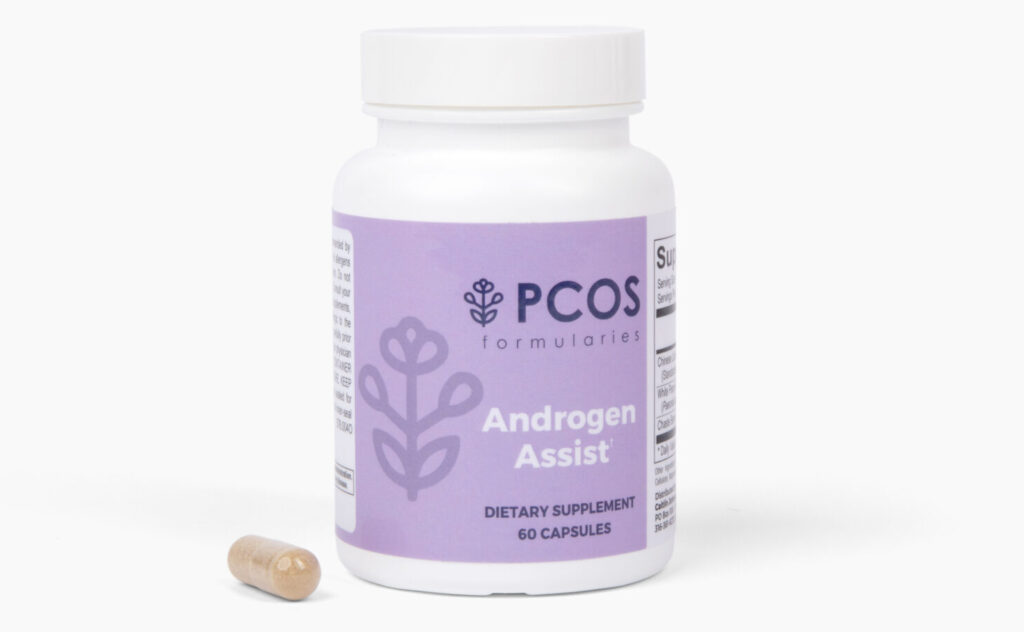
Progesterone Therapies To Stimulate Bleeds, Avoid Miscarriage or Improve Symptoms
Not everyone will do well on hormonal contraceptives or agree with their use based on their values and beliefs. Since there is an increase in the risk of uterine cancer in PCOS, it is important to have stimulated bleeds when your menstrual cycle is absent on its own.
Some doctors will recommend this to mimic a typical 28-30 days cycle. Others I see prescribe this to patients to use every 90 days if they aren’t bleeding on their own.
If you are trying to conceive you may want to discuss using it every 60-90 days if you haven’t had a period or confirmed ovulation to reduce this risk while still giving your body a chance to ovulate. Yes! You can ovulate that late in your cycle.
The medication used most often is called Provera. It is medroxyprogesterone acetate and is used for 7 to 10 days to stimulate the uterine lining to shed. This is important to lower the risk of endometrial cancer.
It is not the same thing as naturally made progesterone so will not help support mood, sleep, or even heart and bone health like progesterone will when the body is ovulating regularly.
I prefer women use a micronized progesterone as this will have a benefit of helping your body to get used to real progesterone. This will usually be proscribed in oral or vaginal suppository form. These will be likely be one of the following prescriptions: Prometrium and Cyclogest.

There are also forms of over the counter progesterone creams and oils. I do not commonly recommend these options. If you need the support of progesterone for luteal phase lengthening, lowering risk of miscarriage or cycle regulation, you will need a prescription strength medication.
There are other forms of progesterone that are taken in the course of IVF and other times in advanced reproductive offerings, and these are usually taken as a intramuscular shot.
If you’d like an alternative to medication to increase progesterone, we have created a supplement that supports insulin levels and can help increase progesterone. It’s called the Anti-Oxidant Ovary Formula and is a great support to trial before medication.
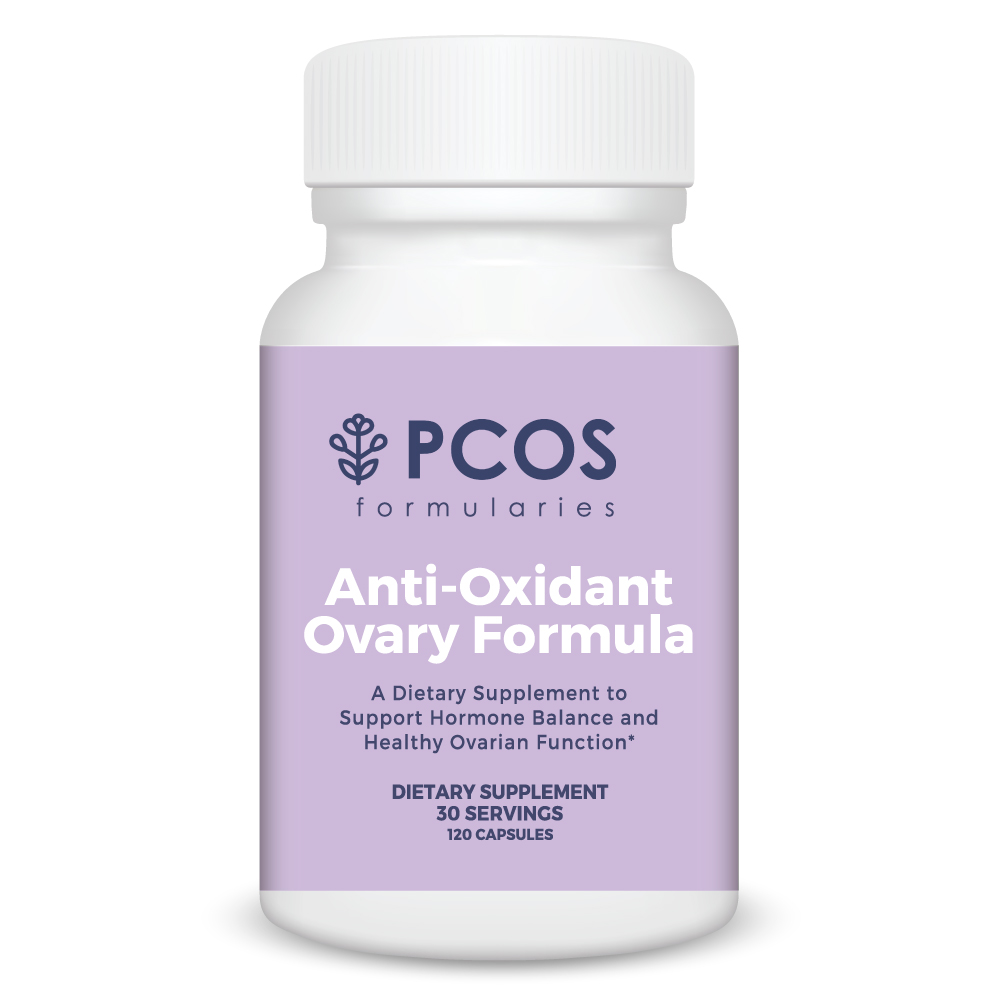
Ovulation Stimulating Medications/ Assisted Reproductive Medications for PCOS
There are a lot of medicines that could go in the category of supports you may receive from your fertility doctor or reproductive endocrinologist. In this section we are going to focus on the two most commonly used.
Clomid(Clomiphene) to Induce Ovulation in PCOS
Clomid, known as clomiphene citrate or serophene, is a treatment option used for fertility in women with PCOS. Clomid is prescribed to synthetically induce ovulation. It causes the pituitary gland to release hormones needed to stimulate ovulation (the release of an egg from the ovary). (7) Essentially, it “tricks” the body into ovulating in hopes of fertilization.
Clomid is significantly cheaper and more accessible than IVF and can be a useful medication for those with PCOS struggling to conceive. In fact, unless there is significant male patterned fertility issues as well, I would never counsel someone to go straight to IVF or IUI without trialing medications to try and stimulate ovulation.
Letrozole(Femara) to Induce Ovulation in PCOS
Letrozole is another medication that can be used for fertility purposes in women with polycystic ovarian syndrome. There is emerging research showing letrozole may have advantages to Clomid.
It may be more successful at ovulation stimulation, has less extreme side effects, and has less chance of multiple gestations (meaning twins or triplets for example). The other consideration is that we aren’t trying to just achieve pregnancy, right? We are looking for live births of healthy babies – letrozole has some research pointing to the fact that it may have more success with this metric. (8)
Both letrozole and clomid work by making the brain to make more estrogen in order to try and stimulate ovulation. They can negatively impact your body’s ability to create fertile cervical mucus. So the “preview” of ovulation may not be as apparent.
Alternatives are first trialing supplements and even medications (like metformin) shown to improve insulin resistance, as that improves often ovulation can happen spontaneously. Moderate weight loss of 5-10% of body weight can also be helpful.
Mental Health and Mood Disorder Support
Women with PCOS have higher rates of anxiety and depression than those who do not have PCOS. This can be even more apparent when struggling with infertility. The symptoms of PCOS like struggling to reach a healthy weight, unwanted hair growth, irregular menstrual periods, heavy bleeding patterns and acne can also impact self-esteem.
It is not uncommon for women with PCOS to struggle with fatigue and irregular sleep patterns. Being aware of mental health difficulties and seeking treatment in the form of medication or even therapy can be helpful for you.
It is very common for someone with PCOS to be on medications to treat anxiety and depression. Be sure to speak with your healthcare provider for which medication may be most helpful for you.
There are certainly alternatives to medications like regular physical activity, circadian rhythm support, adequate sleep, support from a therapist, blood sugar stabilization and so much more. However, these can often be difficult to implement if you are already struggling.
I wish I had known how impactful medication would be to help support my own anxiety. I can only imagine how it would have helped me earlier in my life.
We created the Myoinositol Plus powder to help with the anxiety and depression related mood symptoms that can accompany PCOS. It is great to take before bed to help support evening anxiety, mental chatter. It has two different mood supports and multiple supports for blood sugar balance.
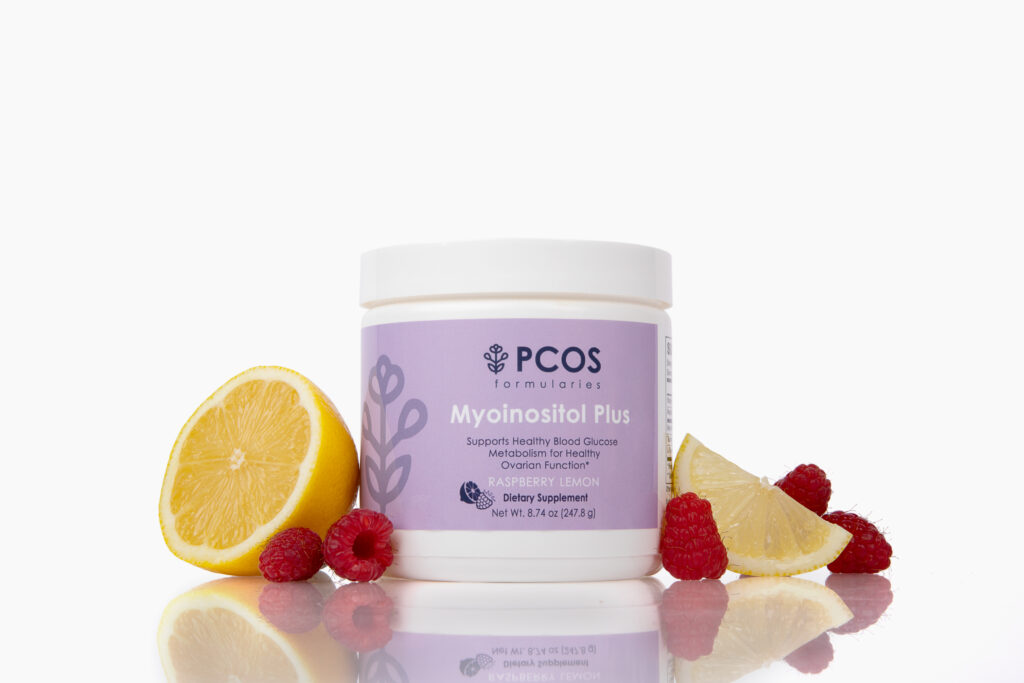
Removing Stigma and Choosing Appropriate Therapies
My hope in educating on these medications is not to discourage someone from trialing them, but to help you find solutions that are appropriate for you right now. Your goals, your health struggles, your symptoms, your labwork, your finances. Perhaps taking 2-3 supplements is out of your financial budget parameters at this time. Yet, your insurance might cover metformin and spironolactone. That might be the right consideration for you right now.
Perhaps you are particularly sensitive to side effects of medications and you’d like to trial something more “natural”. If that is you, there are so many options.
Medications are just one of the tools in the toolbox to help support your body. There is no shame in taking a medication that is suited fo your needs right now. Just make sure you have discussed the benefits, risks, effective doses, side effects, and long-term plan for how long you will be on these medications.
What Else Can You Do?
This drug list may seem like a lot, and depending on your beliefs or attitudes, you may want to take a more holistic or natural approach to manage your PCOS symptoms. I recommend talking to your practitioner, working directly with a dietitian, or trying to implement some complementary natural supplements if that is the case for you. Check out our quiz on PCOS Formularies to pick out supplements suited for your goals and needs.
There is no one size fits all approach to managing PCOS. This diagnosis doesn’t have to rule your life. You can implement some medications or lifestyle changes that can greatly improve your quality of life or chances of conceiving.
References
1. https://www.mayoclinic.org/diseases-conditions/pcos/symptoms-causes/syc-20353439
2. Role of metformin in the management of polycystic ovary syndrome
3. Insulin resistance and hyperinsulinemia in diabetic cardiomyopathy
4. ACOG PCOS
6. Spironolactone in Acne Treatment.
DISCLAIMER
The advice provided in this article is for informational purposes only. It is not meant to augment and not replace consultation with a licensed health care provider. Consultation with a physician, dietitian, naturopathic doctor or other primary care provider is recommended for anyone suffering from a health problem.

I’M CAITLIN JOHNSON!
You are ready to trust your body again. You are ready to fix your hormones and fall in love with your body. Let me show you the way through comprehensive courses to manage your hormones and boost your fertility with PCOS.
Are you
struggling to get pregnant and you don’t know what step to take next. Join Find Fertility today and discover the process hundreds have used to get pregnant and have their dream baby.

